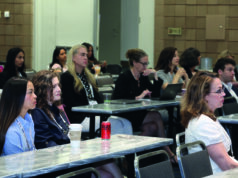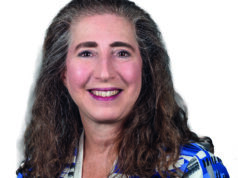 Julie A. Freischlag, MD, used her turn as honorary guest lecturer at the 2023 Midwestern Vascular Surgical Society (MVSS) annual meeting to make a pitch for vascular surgeons to step up to the plate as hospital and institutional leaders—because that is “who you are,” she told the gathering in Minneapolis, Minnesota (Sept. 7–9).
Julie A. Freischlag, MD, used her turn as honorary guest lecturer at the 2023 Midwestern Vascular Surgical Society (MVSS) annual meeting to make a pitch for vascular surgeons to step up to the plate as hospital and institutional leaders—because that is “who you are,” she told the gathering in Minneapolis, Minnesota (Sept. 7–9).
“I would challenge you as vascular surgeons to go and run things,” she said. “Surgeons are really, really good at running things. You make decisions with very little data, and go do it on a Friday night. You make mistakes; things bleed and clot; and you strive to go fix it. You walk into that operating room every day with high hopes.”
Many CEOs and the types of C-suite operators involved in the likes of mergers and acquisitions, on the other hand, walk into the room with “a whole different thought,” Freischlag said. Often, they assume things are going to fail, and “they may not always tell the truth.”
That’s the opposite of the archetypal vascular surgeon, she continued. “What you need to do is get in those rooms and lead those processes, because that is who you are. You make good decisions, are able to own up to your mistakes, and you actually care—about your patients, teams, families and where you are going.”
Freischlag’s lecture was built around the theme of “Daring to do hard things.” Detailing snapshots from her own journey—which, in addition to a lofty career trajectory, also included road bumps such as a divorce—she highlighted themes of resilience, diversity, mentorship and bravery in leadership.
She placed a particular emphasis on the importance of diversity in surgery, referencing the recent publication of the special women’s issue of Annals of Vascular Surgery, for which she was invited to write the introduction.
To illustrate the point, Freischlag detailed her first open aneurysm repair, in San Diego in 1987, when she was just 32 years old. The 82-year-old patient, who presented with a 6cm aneurysm, was due to undergo the procedure when Freischlag walked into the room to a less than rapt wider audience. “Her family was aghast,” she recalled. “Who is this kid, they were thinking,” although the actual patient herself had no reservations, underwent the operation, and came out the other side, Freischlag said. The tale ended with Freischlag receiving two gifts from the lady and her family: a cross-stitched handkerchief crafted by the patient, along with an inscribed gold bracelet marking out the gratitude of the family. Freischlag cherishes the keepsakes still, explaining: “I was the most diverse vascular surgeon anybody saw doing that work back in the 80s— doing her procedure and trusting me, just like our patients trust us in our clinical trials. It’s really important that that continues to happen in all shapes and forms.”
Meanwhile, inclusive leadership means “you take somebody with you wherever you go. If you haven’t introduced one of your students, residents or fellows to somebody at this meeting, shame on you,” Freischlag implored. “You need to take them by the arm, introduce them to leadership, let them present … Watching them grow to do it even better than you did is a wonderful feeling, and it makes the world a better place.”
Leadership is a journey, Freischlag added. It is about helping those around you, but, just like in her case, “it isn’t always easy.” As the COVID-19 pandemic demonstrated, she said, “you get interrupted.”












